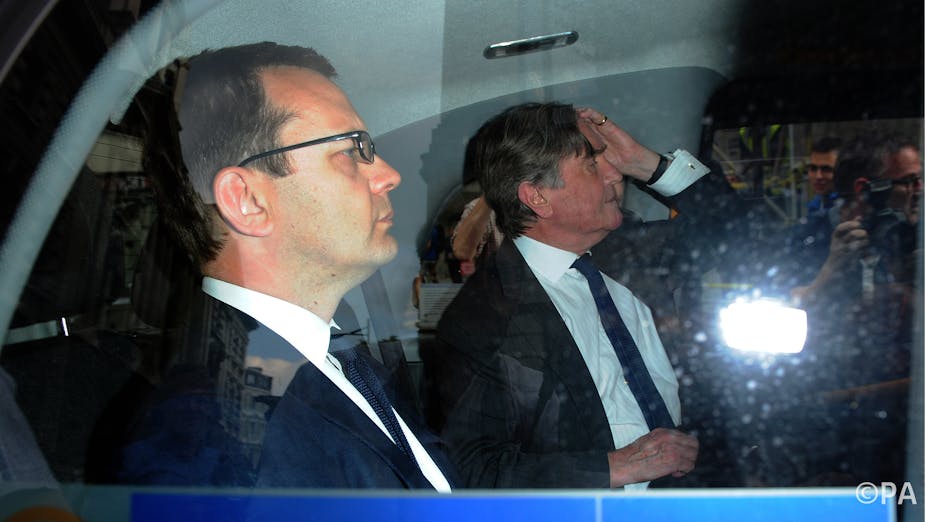The unethical journalism practices laid bare by the phone hacking trial and the Leveson Inquiry have been both astounding and sensational. The parade of celebrities and politicians whose most intimate secrets were revealed through illicit access to their phones was startling, ranging from Hugh Grant, David Blunkett, and Charlotte Church to members of the royal family.
In the trial, Andy Coulson, the former editor of the News of the World who went on to become David Cameron’s head of communications, was been found guilty of conspiracy to hack mobile phones. His former colleague, Rebekah Brooks, was cleared of all charges. The jury failed to reach verdicts on two further charges faced by Coulson and one charge faced by former royal editor Clive Goodman of conspiracy to commit misconduct in public office.
The scandal around phone hacking has been unfolding since the arrest of News of the World private investigator Glenn Mulcaire in August 2006. But perhaps the most shocking revelations surrounded the hacking of murdered school girl Milly Dowler’s phone, giving rise to widespread denunciations of a culture of ruthless, unethical and lawless journalism in the UK. These concerns were further fuelled by the Leveson Inquiry into the culture, practices and ethics of the press in the UK, which published its recommendations in November 2012, calling for a profound overhaul of press regulation in the UK.
Though the drama of the trial and the Leveson Inquiry have placed debates over journalism ethics in the limelight, there is nothing new about either the shocking behaviour of tabloid journalists, or about the debates over how it should be curbed. To anyone familiar with the history of journalism ethics and regulation in the UK, the phone hacking scandal is the logical outcome of the unfortunate union of a highly competitive tabloid industry, and a toothless system of press regulation.
Tabloid newspapers have long used illicit means to gather information. In 1981, newspapers including the Daily Express, the Sun, the Daily Star, the People, the Mail on Sunday and the Daily Mail were found guilty of gross misconduct for making payments to family members of Peter Sutcliffe, the Yorkshire Ripper. Just short of ten years later, tabloid newspapers bought audiotapes of an erotic phone conversation between Prince Charles and Camilla Parker-Bowles, as well as recorded calls between Princess Diana and her lover James Gilbert.
Research by John Henningham and Anthony Delano (detailed in The News Breed: British Journalism, not available online) shows that compared to their US and Australian counterparts, British journalists are far more likely to believe that paying people for information, using confidential documents without permission, using hidden microphones or personal documents, and badgering sources for stories may be justified.
Writing about this in 1998, Henningham and Delano argued:
The strongly competitive newsgathering environment in the UK … may result in a culture in which ethical constraints are somewhat blurred. The relative recency of professional education in journalism may be another factor, together with a lack of a tradition of associations of journalists organised on purely professional (as opposed to union) lines.
At the same time, newspapers in the UK have fought tooth and nail against a stronger regulatory body with a statutory underpinning, as recommended by Lord Justice Leveson. Such resistance to regulation not unique to the UK. It is central to the self-understanding of journalists around the world, which relies centrally on the idea of press freedom and independence. The fight against regulation has been crucial in many national contexts where governments have tried to control media and curb their reporting.
Failure of self-regulation
In the UK, broadcasting is regulated by OFCOM, which has the power to revoke licences and impose major fines. The BBC, as the standard bearer for public service broadcasting, has strict editorial guidelines. However, there is no similar regulatory framework in place for print media. Members of the National Union of Journalists must sign up to its code of ethics, but union membership is not a requirement for practitioners, and figures suggest that union membership has declined by 18% over the past five years, with young journalists reluctant to join.
A succession of voluntary self-regulatory bodies has been charged with overseeing the print media, starting with the General Council in 1953, followed by the Press Council in 1962 and finally the Press Complaints Commission since 1991.
Their history is one of persistent failure in the face of the blatantly irresponsible behaviour of a small but powerful minority of journalists who have shown what it means to have “power without responsibility”.
This autumn, the PCC will be abolished and replaced by the Independent Press Standards Organisation, which describes itself as a “new, tough, independent organisation”. This new body will have far greater powers than its predecessors. It will be able to levy fines up to £1m for serious or systemic wrong-doing, and will have a “standards and compliance arm with investigative powers to call editors to account”.
It is doubtful that the latest incarnation of press regulation will magically transform the culture of the tabloid press. But the public ritual of shaming those responsible, through the phone-hacking trial and the Leveson Inquiry, has brought these issues to the forefront and undermined the public’s trust in the press. News organisations are desperate to regain this trust, and this can only be done by exercising their power with responsibility.

